In response to Bob’s post on atomisation, Jesse Wilbur talks about how his college-era faith in Great Books seems to have largely given way to the sporadic appreciation of 30-second YouTube snippets.
That started me thinking about the literary canon. All those Great Books. There were huge critical quarrels about their validity, how they came to be great and so on: how bound up its measures of ‘quality’ were with historically-specific class and cultural assumptions. And all that.
Thinking of it as contingent and biased and so on makes it hard to think of the canon with anything like the reverence I felt towards it as a teenager. And yet, you don’t have to be T S Eliot to mourn that reverence, and everything it implied. An agreed-upon body of cultural matter that could (notionally, at least) be shared by all. Cultural cohesion externalised in print form. It’s hard not to find that a seductive idea. Cultural capital, shared frames of reference and implicit association with the elites, all easily communicable to a stranger via a few arch quotations.
And yet, if I know this body of supposedly eternal literature is the product of the collective privilege of a bunch of mostly-heterosexual dead white European males, do I really want a shared body of cultural reference framed by those assumptions? Etc, etc. This is an old debate. The question is very literally academic these days. The literary canon is the hobby of a few; new ‘literary’ books are still produced, but it seems increasingly that we are offered a choice between unacceptable (because obviously stacked in favour of the usual contenders) canonical elitism, ham-fisted revisionism, and deadening lowest-common-denominator populism. Given those options, I for one would rather stick to fooling around on messageboards.
So if the canon is this problematic, either adopted or rejected, then what replaces it? Aimless fooling around on messageboards? This atomised culture in which you cannot ever assume that you have any points of reference in common with anyone? Perhaps. Perhaps ’twas ever thus, and the literary canon was a convenient (body of) fiction papering over the cracks.
But if (and yes, I know this is a big if) the best thing the literary canon did for us was to provide a shared frame of reference for at least some, then are there other ways of achieving the same end? Stultifying elitism, PC revisionism, and drooling populism are all, in different ways, heavily invested in the idea of canon itself, which rests on the assumption that cultural content is produced by others for us to consume. This is a big assumption, and one that Alex Itin , the denizens of YouTube and a zillion other Web fora are busy prodding as we speak. It may be that fooling around on messageboards is not aimless at all.
So what does user-generated content do to enable new shared frames of reference? I’m not convinced that YouTube provides more than, as Jesse says, the occasional giggle, nor am I convinced that the ephemerality of messageboard chat is enough for a culture to chew on. But I think new art forms are beginning to emerge. For example, what I like about Itin’s work is that it moves between online and offline spaces, and involves physical exchanges of objects in real time, between strangers or friends. If (again, this is a big if) the aim of co-creation were to begin to reassemble shared points of reference amid a tundra of media atomisation, then stuff that at least in part actually happens in the physical world is infinitely more powerful than on-screen interaction.
There is huge potential in play, social algorithms, games, creative collaborations and as-yet-undiscovered open-source social codings to enable the creation of shared cultural content that can mitigate media atomisation. Computer games, ARGs and the like are beginning to explore this, but there’s much more to investigate. How might it work in textual form? How do you move between online and offline elements? How can such activity be captured? How archived or communicated? Is there a poetics of social algorithms? I can imagine a future in which the development of social algorithms within which co-creation can fruitfully take place – both on and offline – becomes an art form in its own right. And (perhaps fancifully) I imagine our current state of cultural entropy at least mitigated, if not reversed by such a distributed culture of co-creation.
Category Archives: literature
defining the networked book: a few thoughts and a list
The networked book, as an idea and as a term, has gained currency of late. A few weeks ago, Farrar Straus and Giroux launched Pulse , an adventurous marketing experiment in which they are syndicating the complete text of a new nonfiction title in blog, RSS and email. Their web developers called it, quite independently it seems, a networked book. Next week (drum roll), the institute will launch McKenzie Wark’s “GAM3R 7H30RY,” an online version of a book in progress designed to generate a critical networked discussion about video games. And, of course, the July release of Sophie is fast approaching, so soon we’ll all be making networked books.

The institue will launch McKenzie Wark’s GAM3R 7H30RY Version 1.1 on Monday, May 15
The discussion following Pulse highlighted some interesting issues and made us think hard about precisely what it is we mean by “networked book.” Last spring, Kim White (who was the first to posit the idea of networked books) wrote a paper for the Computers and Writing Online conference that developed the idea a little further, based on our experience with the Gates Memory Project, where we tried to create a collaborative networked document of Christo and Jeanne-Claude’s Gates using popular social software tools like Flickr and del.icio.us. Kim later adapted parts of this paper as a first stab at a Wikipedia article. This was a good start.
We thought it might be useful, however, in light of recent discussion and upcoming ventures, to try to focus the definition a little bit more — to create some useful boundaries for thinking this through while holding on to some of the ambiguity. After a quick back-and-forth, we came up with the following capsule definition: “a networked book is an open book designed to be written, edited and read in a networked environment.”
Ok. Hardly Samuel Johnson, I know, but it at least begins to lay down some basic criteria. Open. Designed for the network. Still vague, but moving in a good direction. Yet already I feel like adding to the list of verbs “annotated” — taking notes inside a text is something we take for granted in print but is still quite rare in electronic documents. A networked book should allow for some kind of reader feedback within its structure. I would also add “compiled,” or “assembled,” to account for books composed of various remote parts — either freestanding assets on distant databases, or sections of text and media “transcluded” from other documents. And what about readers having conversations inside the book, or across books? Is that covered by “read in a networked environment”? — the book in a peer-to-peer ecology? Also, I’d want to add that a networked book is not a static object but something that evolves over time. Not an intersection of atoms, but an intersection of intentions. All right, so this is a little complicated.
It’s also possible that defining the networked book as a new species within the genus “book” sows the seeds of its own eventual obsolescence, bound, as we may well be, toward a post-book future. But that strikes me as too deterministic. As Dan rightly observed in his recent post on learning to read Wikipedia, the history of media (or anything for that matter) is rarely a direct line of succession — of this replacing that, and so on. As with the evolution of biological life, things tend to mutate and split into parallel trajectories. The book as the principal mode of discourse and cultural ideal of intellectual achievement may indeed be headed for gradual decline, but we believe the network has the potential to keep it in play far longer than the techno-determinists might think.
But enough with the theory and on to the practice. To further this discussion, I’ve compiled a quick-and-dirty list of projects currently out in the wild that seem to be reasonable candidates for networked bookdom. The list is intentionally small and ridden with gaps, the point being not to create a comprehensive catalogue, but to get a conversation going and collect other examples (submitted by you) of networked books, real or imaginary.
* * * * *
Everyone here at the institute agrees that Wikipedia is a networked book par excellence. A vast, interwoven compendium of popular knowledge, never fixed, always changing, recording within its bounds each and every stage of its growth and all the discussions of its collaborative producers. Linked outward to the web in millions of directions and highly visible on all the popular search indexes, Wikipedia is a city-like book, or a vast network of shanties. If you consider all its various iterations in 229 different languages it resembles more a pan-global tradition, or something approaching a real-life Hitchhiker’s Guide to the Galaxy. And it is only five years in the making.
But already we begin to run into problems. Though we are all comfortable with the idea of Wikipedia as a networked book, there is significant discord when it comes to Flickr, MySpace, Live Journal, YouTube and practically every other social software, media-sharing community. Why? Is it simply a bias in favor of the textual? Or because Wikipedia – the free encyclopedia — is more closely identified with an existing genre of book? Is it because Wikipedia seems to have an over-arching vision (free, anyone can edit it, neutral point of view etc.) and something approaching a coherent editorial sensibility (albeit an aggregate one), whereas the other sites just mentioned are simply repositories, ultimately shapeless and filled with come what may? This raises yet more questions. Does a networked book require an editor? A vision? A direction? Coherence? And what about the blogosphere? Or the world wide web itself? Tim O’Reilly recently called the www one enormous ebook, with Google and Yahoo as the infinitely mutable tables of contents.
Ok. So already we’ve opened a pretty big can of worms (Wikipedia tends to have that effect). But before delving further (and hopefully we can really get this going in the comments), I’ll briefly list just a few more experiments.
>>> Code v.2 by Larry Lessig
From the site:
“Lawrence Lessig first published Code and Other Laws of Cyberspace in 1999. After five years in print and five years of changes in law, technology, and the context in which they reside, Code needs an update. But rather than do this alone, Professor Lessig is using this wiki to open the editing process to all, to draw upon the creativity and knowledge of the community. This is an online, collaborative book update; a first of its kind.
“Once the project nears completion, Professor Lessig will take the contents of this wiki and ready it for publication.”
Recently discussed here, there is the new book by Yochai Benkler, another intellectual property heavyweight:
>>> The Wealth of Networks
Yale University Press has set up a wiki for readers to write collective summaries and commentaries on the book. PDFs of each chapter are available for free. The verdict? A networked book, but not a well executed one. By keeping the wiki and the text separate, the publisher has placed unnecessary obstacles in the reader’s path and diminished the book’s chances of success as an organic online entity.
>>> Our very own GAM3R 7H30RY
On Monday, the institute will launch its most ambitious networked book experiment to date, putting an entire draft of McKenzie Wark’s new book online in a compelling interface designed to gather reader feedback. The book will be matched by a series of free-fire discussion zones, and readers will have the option of syndicating the book over a period of nine weeks.
>>> The afore-mentioned Pulse by Robert Frenay.
Again, definitely a networked book, but frustratingly so. In print, the book is nearly 600 pages long, yet they’ve chosen to serialize it a couple pages at a time. It will take readers until November to make their way through the book in this fashion — clearly not at all the way Frenay crafted it to be read. Plus, some dubious linking made not by the author but by a hired “linkologist” only serves to underscore the superficiality of the effort. A bold experiment in viral marketing, but judging by the near absence of reader activity on the site, not a very contagious one. The lesson I would draw is that a networked book ought to be networked for its own sake, not to bolster a print commodity (though these ends are not necessarily incompatible).
>>> The Quicksilver Wiki (formerly the Metaweb)
A community site devoted to collectively annotating and supplementing Neal Stephenson’s novel “Quicksilver.” Currently at work on over 1,000 articles. The actual novel does not appear to be available on-site.
>>> Finnegans Wiki
A complete version of James Joyce’s demanding masterpiece, the entire text placed in a wiki for reader annotation.
>>> There’s a host of other literary portals, many dating back to the early days of the web: Decameron Web, the William Blake Archive, the Walt Whitman Archive, the Rossetti Archive, and countless others (fill in this list and tell us what you think).
Lastly, here’s a list of book blogs — not blogs about books in general, but blogs devoted to the writing and/or discussion of a particular book, by that book’s author. These may not be networked books in themselves, but they merit study as a new mode of writing within the network. The interesting thing is that these sites are designed to gather material, generate discussion, and build a community of readers around an eventual book. But in so doing, they gently undermine the conventional notion of the book as a crystallized object and begin to reinvent it as an ongoing process: an evolving artifact at the center of a conversation.
Here are some I’ve come across (please supplement). Interestingly, three of these are by current or former editors of Wired. At this point, they tend to be about techie subjects:
>>> An exception is Without Gods: Toward a History of Disbelief by Mitchell Stephens (another institute project).
“The blog I am writing here, with the connivance of The Institute for the Future of the Book, is an experiment. Our thought is that my book on the history of atheism (eventually to be published by Carroll and Graf) will benefit from an online discussion as the book is being written. Our hope is that the conversation will be joined: ideas challenged, facts corrected, queries answered; that lively and intelligent discussion will ensue. And we have an additional thought: that the web might realize some smidgen of benefit through the airing of this process.”
>>> Searchblog
John Battelle’s daily thoughts on the business and technology of web search, originally set up as a research tool for his now-published book on Google, The Search.
>>> The Long Tail
Similar concept, “a public diary on the way to a book” chronicling “the shift from mass markets to millions of niches.” By current Wired editor-in-chief Chris Anderson.
>>> Darknet
JD Lasica’s blog on his book about Hollywood’s war against amateur digital filmmakers.
>>> The Technium
Former Wired editor Kevin Kelly is working through ideas for a book:
“As I write I will post here. The purpose of this site is to turn my posts into a conversation. I will be uploading my half-thoughts, notes, self-arguments, early drafts and responses to others’ postings as a way for me to figure out what I actually think.”
>>> End of Cyberspace by Alex Soojung-Kim Pang
Pang has some interesting thoughts on blogs as research tools:
“This begins to move you to a model of scholarly performance in which the value resides not exclusively in the finished, published work, but is distributed across a number of usually non-competitive media. If I ever do publish a book on the end of cyberspace, I seriously doubt that anyone who’s encountered the blog will think, “Well, I can read the notes, I don’t need to read the book.” The final product is more like the last chapter of a mystery. You want to know how it comes out.
“It could ultimately point to a somewhat different model for both doing and evaluating scholarship: one that depends a little less on peer-reviewed papers and monographs, and more upon your ability to develop and maintain a piece of intellectual territory, and attract others to it– to build an interested, thoughtful audience.”
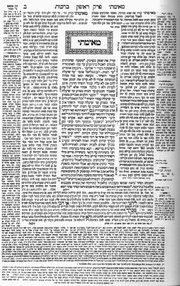
* * * * *
This turned out much longer than I’d intended, and yet there’s a lot left to discuss. One question worth mulling over is whether the networked book is really a new idea at all. Don’t all books exist over time within social networks, “linked” to countless other texts? What about the Talmud, the Jewish compendium of law and exigesis where core texts are surrounded on the page by layers of commentary? Is this a networked book? Or could something as prosaic as a phone book chained to a phone booth be considered a networked book?
In our discussions, we have focused overwhelmingly on electronic books within digital networks because we are convinced that this is a major direction in which the book is (or should be) heading. But this is not to imply that the networked book is born in a vacuum. Naturally, it exists in a continuum. And just as our concept of the analog was not fully formed until we had the digital to hold it up against, perhaps our idea of the book contains some as yet undiscovered dimensions that will be revealed by investigating the networked book.
quoting a quote
Bud Parr, author of the blog Chekhov’s Mistress and commenter on if:book, recently posted on a speech given by Susan Sontag, entitled “Literature is Freedom.”
Quoting, his favorite quote:
A writer, I think, is someone who pays attention to the world. That means trying to understand, take in, connect with, what wickedness human beings are capable of; and not be corrupted – made cynical, superficial – by this understanding.
Literature can tell us what the world is like.
Literature can give us standards and pass on deep knowledge, incarnated in language, in narrative.
Literature can train, and exercise, our ability to weep for those who are not us or ours.
At the institute, we often describe the “book” as both a vessel (technology) and text (information) especially as we work on revising our mission statement. Even so, and only speaking for myself, it is still very easy to get caught up in things like networks, copyright policy, and Web 2.0, which are, of course, all important topics. Sontag’s quote is a good reminder of not just what resides in the vessel of the book, but why its contents are valuable.
X_Reloaded.
This is a bilingual (English/Spanish) post. Spanish version can be found lower down.
Santofile, uses “meme” to allude to creative freedom in the digital world. Meme is mimesis and is self-generating. It refers to mediation in the sense of remix and appropriation, to the mixing of works that circulate in the Internet in order to produce an original piece. Among Santofile’s projects is X_Reloaded, an interpretation of the first chapter of Don Quixote, compiled from disparate works inspired by the fourth centennial of its publication.
They put together such diverse creators as William Burroughs and Adbusters, whose common context is precisely the idea of busting. Busting decontextualizes a piece (work of art, advertisement, text) causing it to lose its character as a static icon by giving it a new life inside a new context.
To choose Don Quixote as the text for X_Reloaded, is an allusion to the concept of remix per excellence. Cervantes appropriated chivalry novels with the intention to subvert the genre, and his final remix, decontextualized, is a unique and original work. Printing itself in Cervantes’ times required a highly legible copy, which wasn’t necessarily the original manuscript. Thus, the “original” was a copy made by one or more amanuenses. And from this “original” corrected by the author, a sort of predecessor of proofreading, the book was put together by the typesetter, with its consequent errata. It is interesting to note that the Spanish Royal Academy’s edition of Don Quixote, that celebrates its fourth centennial, claims to be based on about a hundred editions, old and new. If this is not remix, what is?
Cervantes himself is absolutely aware of what he is doing, and of the subversive
character of his action. When Don Quixote reads, we don’t know who is the madman, him or the one who wrote this:
The reason of the unreason with which my reason is afflicted so weakens my reason that with reason I murmur at your beauty.
Don Quixote changed forever the way novels were written, and three centuries later, Borges’ “Pierre Menard, author of Don Quixote” would change forever the way one reads. Pierre Menard writes Don Quixote without ceasing to be Pierre Menard, demonstrating how it is possible to transform a text without altering a single word. Decontextualization was inaugurated.
Following that tradition, X_Loaded presents us jodi’s map, images like, Olia Lialina’s, the conceptual text of Jennny Holzer, or Rosa Llop’s windmills.
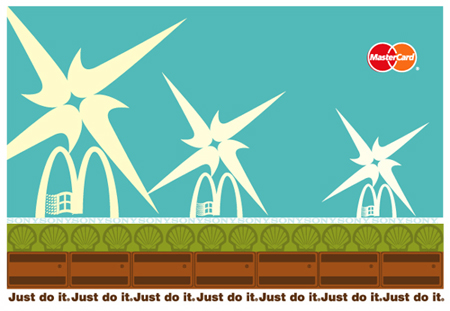
With her windmills we have to say with Don Quixote, they are indeed giants.
X_Reloaded en español.
Santofile, usa el concepto de meme para aludir a libertad de creación en el mundo digital. Meme es mimesis y es autogenerador. Se refiere a mediación, en el sentido de remix, de mezclar apropiándose de trabajos de otros, generalmente trabajo digital que circula por la red, para a la vez producir una nueva obra original. Entre sus proyectos está X_Reloaded una interpretación del capítulo primero de El Quijote, que recoge obras dispares inspiradas por el cuarto centenario de su publicación.,
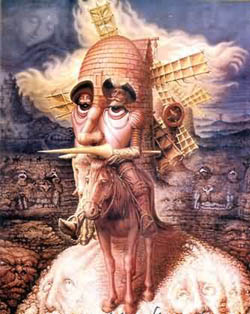 Se reunen creadores tan disímiles como William Burroughs y Adbusters, cuyo contexto comun sería precisamente la idea de romper, de volver trizas, que está en el seno mismo del verbo “to bust”. Al descontextualizar lo que se quiere romper, se le roba permanencia como ícono estático y se le confiere nueva vida dentro de un nuevo contexto.
Se reunen creadores tan disímiles como William Burroughs y Adbusters, cuyo contexto comun sería precisamente la idea de romper, de volver trizas, que está en el seno mismo del verbo “to bust”. Al descontextualizar lo que se quiere romper, se le roba permanencia como ícono estático y se le confiere nueva vida dentro de un nuevo contexto.
El escoger precisamente El Quijote como texto para X_Reloaded, es aludir al remix por excelencia. Cervantes se apropia de las novelas de caballería para subvertir el génro, y su remix final, al descontextualizarlas, es una obra unica y original. La impresión misma del texto en tiempos de Cervantes, requería de una copia altamente legible, lo que no necesariamente era el manuscrito original. De ahí que el “original” eran una copia hecha por uno o más amanuenses. Y de ese “original”corregido por el autor, salía el libro, armado por el cajista, con sus consiguientes errores. Es interesante notar que la edición de la Real Academia Española, con motivo del cuarto centenario de El Quijote, es un “texto crítico de la obra constituido sobre la consulta de cerca de un centenar de ediciones antiguas y modernas”. Si esto no es remix, ¿qué es?
Cervantes mismo es absolutamente consciente de lo que está haciendo, y del carácter subversivo de su acción. Cuando Don Qujiote lee no sabemos si es él el loco, o el que escribió esto:
La razón de la sinrazón que a mi razón se hace, de tal manera mi razón enflaquece, que con razón me quejo de la vuestra fermosura
El Quijote va a cambiar para siempre la manera como se escribe y tres siglos más tarde, “Pierre Menard autor del Quijote” de Borges, va a cambiar la manera como se lee. Pierre Menard escribe El Quijote sin dejar de ser Pierre Menard, demostrando cómo se transforma un texto sin cambiarlo, inaugurando la descontextualización.
Siguiendo esta tradición, X_Loaded nos presenta el mapa de jodi, imágenes como la de, Olia Lialina’, el texto conceptual de Jennny Holzer, o los molinos de viento de Rosa Llop’. Y con ellos, tenemos que decir con Don Quijote, los molinos son en verdad gigantes. Rosa Llop. Y con ellos, tenemos que decir con Don Quijote, los molinos son en verdad gigantes.
making games matter
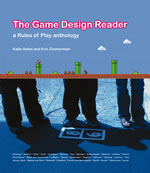
Making Games Matter, a roundtable discussion on the past, present and future of games at Parsons the New School for Design (12/9/05), was a thought-provoking event that brought together an interesting, and heterogeneous, group of experimental game developers, game designers, and seasoned academics. Participants ranged from the creators of Half-Life, Paranoia, and Adventure for the Atari 2600 to theorists of play history and game culture. This meeting was part of DEATHMATCH IN THE STACKS celebrating the launch of The Game Design Reader: A Rules of Play Anthology, edited by Katie Salen and Eric Zimmerman, and published by MIT Press. The book is a collection of essays that spans 50 years of game design and game studies.
The need to define the present of games was central to the conversation. The academics find that there is a lack of a precise vocabulary exclusive to games. At the same time, they question the use of certain terms by game designers. Videogames started outside the academy and they exhibit a certain hybrid nature, especially as they incorporate aspects of many disciplines. Now, when they are claiming their academic legitimacy, they encounter the “territorial” resistance distinctive of academia. Film or literature, for instance, can be defined within their own terms, but game theory still borrows from other disciplines to define itself. Even though games function as abstract linguistic systems, there is a resistance to analyze and to validate them. “Interactive narrative” is a new concept and it should be studied as such, not by substituting or superimposing it to other disciplines.
The term “industry” that kept coming up in the conversation, was questioned by one of the participants, as it was the use of the verb “to play” in reference to what one does with a videogame. However, do film schools question that film is an industry? What is book publishing anyway? On the other hand, the interactive nature of games, the fact that the players are part of them, is intimately tied to the notions of pleasure and enjoyment that are at the core of the concept of playing. New forms of media technology replace each other, but everyone who has played as a child has used some sort of toy, a medium for amusement and imaginative pretense. So, in fact, one “plays” videogames. When these questions were raised, game designers brought up, as a sort of definer, the differentiation between the industry as producer and the gamer as part of a community. This difference is illustrated in an article by Seth Schiesel, “For the Online Star Wars Game, It’s Revenge of the Fans,” in The New York Times (12/10/05). He reports on how for the players of the online Star Wars game, the camaraderie and friendship they developed with other players became far more important than playing itself, as they formed “relationships that can be hard to replicate in ‘real life.'” This affirmation in itself provocative, raises important questions.
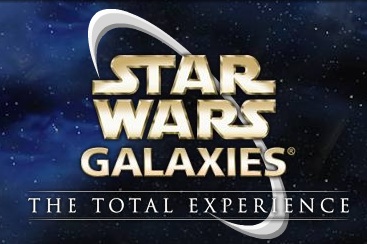
Last month, LucasArts and Sony’s online game division, which have run Star Wars Galaxies since its introduction in 2003, unsatisfied with the product’s moderate success, radically revamped the game in an attempt to appeal to a younger audience. But to thousands of players, mostly adults, the shifts have meant the destruction of online communities. “We just feel violated,” said Carolyn R. Hocke, 46, a marketing Web technician for Ministry Medical Group and St. Michael’s Hospital in Stevens Point, Wis. “For them to just come along and destroy our community has prompted a lot of death-in-the-family-type grieving,” she said. “They went through the astonishment and denial, then they went to the anger part of it, and now they are going through the sad and helpless part of grieving. I work in the health-care industry, and it’s very similar.” One of the participants in Making Games Matter, referred to games as “stylized social interaction,” and Scheisel’s report shows a strikingly real side of those interactions.
After the roundtable, there was an event described as “an evening of discussion and playful debate with game critics, game creators, and game players about the past, present, and future of games.” The make-up of the group shows a refreshing permeability that academia is reluctant to acknowledge, but that is enriching and opens up all kinds of possibilities for experimentation and innovation well beyond the mere notion of play.
the poetry archive – nice but a bit mixed up
Last week U.K. Poet Laureate Andrew Motion and recording producer Richard Carrington rolled out The Poetry Archive, a free (sort of) web library that aims to be “the world’s premier online collection of recordings of poets reading their work” — “to help make poetry accessible, relevant and enjoyable to a wide audience.”  The archive naturally focuses on British poets, but offers a significant selection of english-language writers from the U.S. and the British Commonwealth countries. Seamus Heaney is serving as president of the archive.
The archive naturally focuses on British poets, but offers a significant selection of english-language writers from the U.S. and the British Commonwealth countries. Seamus Heaney is serving as president of the archive.
For each poet, a few streamable mp3s are available, including some rare historic recordings dating back to the earliest days of sound capture, from Robert Browning to Langston Hughes. The archive also curates a modest collection of children’s poetry, and invites teachers to use these and other recordings in the classroom, also providing tips for contacting poets so schools, booksellers and community organizations (again, this is focused on Great Britain) can arrange readings and workshops. While some of this advice seems useful, but it reads more like a public relations/ecudation services page on a publisher’s website. Is this a public archive or a poets’ guild?
The Poetry Archive is a nice resource as both historic repository and contemporary showcase, but the mission seems a bit muddled. They say they’re an archive, but it feels more like a CD store.
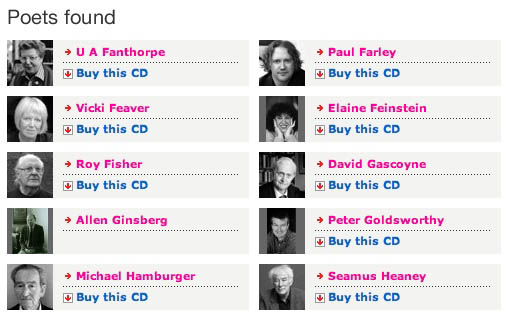
Throughout, the archive seems an odd mix of public service and professional leverage for contemporary poets. That’s all well and good, but it could stand a bit more of the former. Beyond the free audio offerings (which are quite skimpy), CDs are available for purchase that include a much larger selection of recordings. The archive is non-profit, and they seem to be counting in significant part on these sales to maintain operations. Still, I would add more free audio, and focus on selling individual recordings and playlists as downloads — the iTunes model. Having streaming teasers and for-sale CDs as the only distribution models seems wrong-headed, and a bit disingenuous if they are to call themselves an archive. It would also be smart to sell subscriptions to the entire archive, with institutional rates for schools. Podcasting would also be a good idea — a poem a day to take with you on your iPod, weaving poetry into daily life.
There’s a growing demand on the web for the spoken word, from audiobooks, podcasts, to performed poetry. The archive would probably do a lot better if they made more of their collection free, and at the same time provided a greater variety of ways to purchase recordings.
google on the air
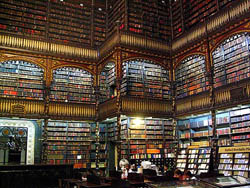
Open Source’s hour on the Googlization of libraries was refreshingly light on the copyright issue and heavier on questions about research, reading, the value of libraries, and the public interest. With its book-scanning project, Google is a private company taking on the responsibilities of a public utility, and Siva Vaidhyanathan came down hard on one of the company’s chief legal reps for the mystery shrouding their operations (scanning technology, algorithms and ranking system are all kept secret). The rep reasonably replied that Google is not the only digitization project in town and that none of its library partnerships are exclusive. But most of his points were pretty obvious PR boilerplate about Google’s altruism and gosh darn love of books. Hearing the counsel’s slick defense, your gut tells you it’s right to be suspicious of Google and to keep demanding more transparency, clearer privacy standards and so on. If we’re going to let this much information come into the hands of one corporation, we need to be very active watchdogs.
Our friend Karen Schneider then joined the fray and as usual brought her sage librarian’s perspective. She’s thrilled by the possibilities of Google Book Search, seeing as it solves the fundamental problem of library science: that you can only search the metadata, not the texts themselves. But her enthusiasm is tempered by concerns about privatization similar to Siva’s and a conviction that a research service like Google can never replace good librarianship and good physical libraries. She also took issue with the fact that Book Search doesn’t link to other library-related search services like Open Worldcat. She has her own wrap-up of the show on her blog.
Rounding out the discussion was Matthew G. Kirschenbaum, a cybertext studies blogger and professor of english at the University of Maryland. Kirschenbaum addressed the question of how Google, and the web in general, might be changing, possibly eroding, our reading practices. He nicely put the question in perspective, suggesting that scattershot, inter-textual, “snippety” reading is in fact the older kind of reading, and that the idea of sustained, deeply immersed involvement with a single text is largely a romantic notion tied to the rise of the novel in the 18th century.
A satisfying hour, all in all, of the sort we should be having more often. It was fun brainstorming with Brendan Greeley, the Open Source on “blogger-in-chief,” on how to put the show together. Their whole bit about reaching out to the blogosphere for ideas and inspiration isn’t just talk. They put their money where their mouth is. I’ll link to the podcast when it becomes available.
image: Real Gabinete Português de Literatura, Rio de Janeiro – Claudio Lara via Flickr
thinking about google books: tonight at 7 on radio open source
While visiting the Experimental Television Center in upstate New York this past weekend, Lisa found a wonderful relic in a used book shop in Owego, NY — a small, leatherbound volume from 1962 entitled “Computers,” which IBM used to give out as a complimentary item. An introductory note on the opening page reads:
The machines do not think — but they are one of the greatest aids to the men who do think ever invented! Calculations which would take men thousands of hours — sometimes thousands of years — to perform can be handled in moments, freeing scientists, technicians, engineers, businessmen, and strategists to think about using the results.
This echoes Vannevar Bush’s seminal 1945 essay on computing and networked knowledge, “As We May Think”, which more or less prefigured the internet, web search, and now, the migration of print libraries to the world wide web. Google Book Search opens up fantastic possibilities for research and accessibility, enabling readers to find in seconds what before might have taken them hours, days or weeks. Yet it also promises to transform the very way we conceive of books and libraries, shaking the foundations of major institutions. Will making books searchable online give us more time to think about the results of our research, or will it change the entire way we think? By putting whole books online do we begin the steady process of disintegrating the idea of the book as a bounded whole and not just a sequence of text in a massive database?
The debate thus far has focused too much on the legal ramifications — helped in part by a couple of high-profile lawsuits from authors and publishers — failing to take into consideration the larger cognitive, cultural and institutional questions. Those questions will hopefully be given ample air time tonight on Radio Open Source.
Tune in at 7pm ET on local public radio or stream live over the web. The show will also be available later in the week as a podcast.
sober thoughts on google: privatization and privacy
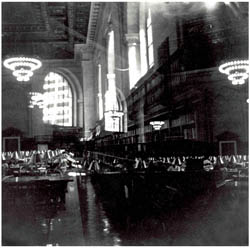
Siva Vaidhyanathan has written an excellent essay for the Chronicle of Higher Education on the “risky gamble” of Google’s book-scanning project — some of the most measured, carefully considered comments I’ve yet seen on the issue. His concerns are not so much for the authors and publishers that have filed suit (on the contrary, he believes they are likely to benefit from Google’s service), but for the general public and the future of libraries. Outsourcing to a private company the vital task of digitizing collections may prove to have been a grave mistake on the part of Google’s partner libraries. Siva:
The long-term risk of privatization is simple: Companies change and fail. Libraries and universities last…..Libraries should not be relinquishing their core duties to private corporations for the sake of expediency. Whichever side wins in court, we as a culture have lost sight of the ways that human beings, archives, indexes, and institutions interact to generate, preserve, revise, and distribute knowledge. We have become obsessed with seeing everything in the universe as “information” to be linked and ranked. We have focused on quantity and convenience at the expense of the richness and serendipity of the full library experience. We are making a tremendous mistake.
This essay contains in abundance what has largely been missing from the Google books debate: intellectual courage. Vaidhyanathan, an intellectual property scholar and “avowed open-source, open-access advocate,” easily could have gone the predictable route of scolding the copyright conservatives and spreading the Google gospel. But he manages to see the big picture beyond the intellectual property concerns. This is not just about economics, it’s about knowledge and the public interest.
What irks me about the usual debate is that it forces you into a position of either resisting Google or being its apologist. But this fails to get at the real bind we all are in: the fact that Google provides invaluable services and yet is amassing too much power; that a private company is creating a monopoly on public information services. Sooner or later, there is bound to be a conflict of interest. That is where we, the Google-addicted public, are caught. It’s more complicated than hip versus square, or good versus evil.
Here’s another good piece on Google. On Monday, The New York Times ran an editorial by Adam Cohen that nicely lays out the privacy concerns:
Google says it needs the data it keeps to improve its technology, but it is doubtful it needs so much personally identifiable information. Of course, this sort of data is enormously valuable for marketing. The whole idea of “Don’t be evil,” though, is resisting lucrative business opportunities when they are wrong. Google should develop an overarching privacy theory that is as bold as its mission to make the world’s information accessible – one that can become a model for the online world. Google is not necessarily worse than other Internet companies when it comes to privacy. But it should be doing better.
Two graduate students in Stanford in the mid-90s recognized that search engines would the most important tools for dealing with the incredible flood of information that was then beginning to swell, so they started indexing web pages and working on algorithms. But as the company has grown, Google’s admirable-sounding mission statement — “to organize the world’s information and make it universally accessible and useful” — has become its manifest destiny, and “information” can now encompass the most private of territories.
At one point it simply meant search results — the answers to our questions. But now it’s the questions as well. Google is keeping a meticulous record of our clickstreams, piecing together an enormous database of queries, refining its search algorithms and, some say, even building a massive artificial brain (more on that later). What else might they do with all this personal information? To date, all of Google’s services are free, but there may be a hidden cost.
“Don’t be evil” may be the company motto, but with its IPO earlier this year, Google adopted a new ideology: they are now a public corporation. If web advertising (their sole source of revenue) levels off, then investors currently high on $400+ shares will start clamoring for Google to maintain profits. “Don’t be evil to us!” they will cry. And what will Google do then?
images: New York Public Library reading room by Kalloosh via Flickr; archive of the original Google page
world digital library
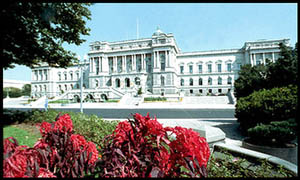 The Library of Congress has announced plans for the creation of a World Digital Library, “a shared global undertaking” that will make a major chunk of its collection freely available online, along with contributions from other national libraries around the world. From The Washington Post:
The Library of Congress has announced plans for the creation of a World Digital Library, “a shared global undertaking” that will make a major chunk of its collection freely available online, along with contributions from other national libraries around the world. From The Washington Post:
…[the] goal is to bring together materials from the United States and Europe with precious items from Islamic nations stretching from Indonesia through Central and West Africa, as well as important materials from collections in East and South Asia.
Google has stepped forward as the first corporate donor, pledging $3 million to help get operations underway. At this point, there doesn’t appear to be any direct connection to Google’s Book Search program, though Google has been working with LOC to test and refine its book-scanning technology.
